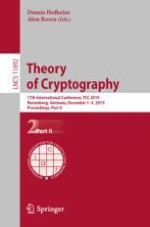2019 | OriginalPaper | Buchkapitel
Continuously Non-malleable Secret Sharing for General Access Structures
verfasst von : Gianluca Brian, Antonio Faonio, Daniele Venturi
Erschienen in: Theory of Cryptography
Aktivieren Sie unsere intelligente Suche, um passende Fachinhalte oder Patente zu finden.
Wählen Sie Textabschnitte aus um mit Künstlicher Intelligenz passenden Patente zu finden. powered by
Markieren Sie Textabschnitte, um KI-gestützt weitere passende Inhalte zu finden. powered by
Abstract
-
In the plain model, assuming one-to-one one-way functions, we show how to obtain noisy-leakage-resilient continuous non-malleability for arbitrary access structures, in case the attacker can continuously leak from and tamper with all of the shares independently.
-
In the common reference string model, we show how to obtain a new flavor of security which we dub bounded-leakage-resilient continuous non-malleability under selective \(k\)-partitioning. In this model, the attacker is allowed to partition the target \(n\) shares into any number of non-overlapping blocks of maximal size \(k\), and then can continuously leak from and tamper with the shares within each block jointly. Our construction works for arbitrary access structures, and assuming (doubly enhanced) trapdoor permutations and collision-resistant hash functions, we achieve a concrete instantiation for \(k\in O(\log n)\).
